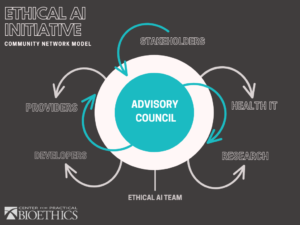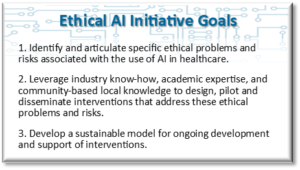Equitable Treatment and Care: Ethical AI Initiative Poised to Test Recommendations
Equitable Treatment and Care: Ethical AI Initiative Poised to Test Recommendations
There is broad agreement about the need to address ethical problems in the development and use of artificial intelligence systems in healthcare. The Center for Practical Bioethics is tackling the challenge of how to go about it using a novel approach that’s inviting widespread interest and buy-in.
Drawing on community-based participatory methodologies long used in public health promotion and services to improve health outcomes, the Ethical AI Initiative – led by Lindsey Jarrett, PhD, Principal Investigator and Program Director at the Center – is convening leaders primarily in the Kansas City region to provide practical interventions on ethical problems that arise at various stages throughout AI’s lifecycle in healthcare.
Community Leadership
By putting community members in leadership and decision-making positions, the Initiative works to reduce potential harms due to systemic biases that negatively impact marginalized members of the community.
 Initiative stakeholders have tasked themselves with building a framework that requires an educational curriculum, diverse partnerships, best practices standards, and validation of tools to address inequities, biases and potential harms, particularly to marginalized communities.
Initiative stakeholders have tasked themselves with building a framework that requires an educational curriculum, diverse partnerships, best practices standards, and validation of tools to address inequities, biases and potential harms, particularly to marginalized communities.
With first and second year funding from the Sunderland Foundation, the Initiative is now poised to implement educational programming and test recommendations identified by collaborators. The Initiative has formal support from BioNexus KC, Children’s Mercy Research Institute, Cerner Charitable Foundation, KC Digital Drive and The University of Kansas Health System.
2022 Pilot
 In 2022 the Initiative plans to:
In 2022 the Initiative plans to:
- Expand Advisory Council membership to incorporate community members who identify as community advocates and who represent vulnerable populations that regularly utilize healthcare services in their communities; and
- Develop and implement a pilot program with The University of Kansas Health System.
“Overall success of the Initiative depends on interrelationships between and among key stakeholders focused on equitable treatment and care for vulnerable persons in the deployment of AI in healthcare,” said Jarrett. “With that in mind, we are always seeking additional community partners, students, researchers and other to help us push this important topic forward.”


